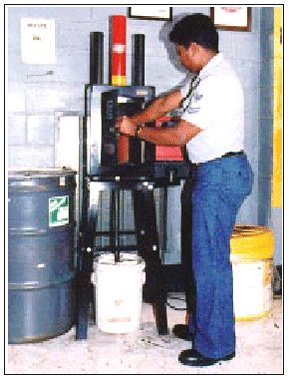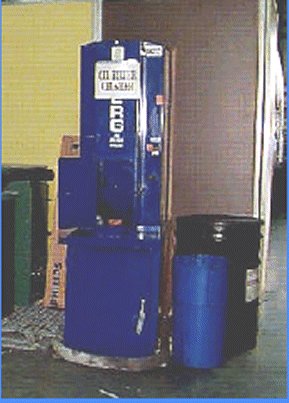To classify used
oil filters as non-hazardous solid waste for disposal purposes or for metal
recycling, filters are crushed or otherwise voided. Waste managers must
contact recycling facilities to ensure drainage techniques and handling
methods are compatible with the recycling facility's requirements. Waste
managers must also contact their state to verify what requirements may apply
beyond the following federal Environmental Protection Agency (EPA) requirements.
Several states have more stringent requirements and do not allow the disposal
of oil filters in landfills.
The EPA used oil filter regulation, published in Title 40 Code of Federal
Regulations (CFR) Section 261.4(b)(13), "Exclusions"
states non-terne plated used oil filters are excluded from
regulation as a hazardous waste provided they are not mixed with
any of the wastes listed in Subpart D, "Lists of Hazardous
Wastes." Specifically, three criteria for the filters must be
met: 1) the filters must not be terne plated; 2) must not be mixed with
other listed hazardous waste; and 3) must be gravity hot-drained. These
criteria are further explained as follows.
Non-Terne Plated
Terne is an alloy of tin and lead formerly used to cover the interior
of oil filters. The lead content may cause terne-plated filters to become toxic.
Mixture Rule
According to 40 CFR 261.3 "definition of hazardous waste,"
a solid waste is exempted from regulation as a hazardous waste if it is
excluded under 40 CFR 261.4(b). The exclusion in 40 CFR 261.4(b)
applies only to hot-drained, non-terne plated used oil filters that have not
been mixed with wastes that are listed in Subpart D of 40 CFR 261.
Gravity Hot-Draining
Non-terne plated used oil filters are exempted from regulation as a hazardous
waste provided they have been gravity hot-drained using one of the following methods:
- Puncturing the filter anti-drain back valve or the filter dome end and hot-draining;
- Hot-draining and crushing;
- Dismantling and hot-draining; or
- Any other equivalent hot-draining method that will remove used oil.
The EPA defines hot draining in the Federal Register, Volume 57, Page 21523
(57 FR 21523) as draining the oil filter near engine operating temperature
and above room temperature. The EPA also recommends a minimum hot-drain time
of 12 hours. The preamble also states, "if an oil filter is picked up by
hand or lifted by machinery and used oil immediately drips or runs from the
filter, the filter should not be considered to be drained." Some states
require a greater amount of oil to be removed from the filters before recycling.
Oil filters are currently collected for recycling at Naval Station San Diego.
The filters are crushed using a commercial filter crusher. All free-flowing oil
is removed and collected during the crushing process. The used filters are
gathered until a minimum of 5,000 pounds is accumulated. The collected filters
are shipped to a local steel mill, where they are used as feed stock in the
company's steel mill operations.
An oil filter crushing operation has also been established at the Puget Sound
Naval Shipyard. This operation has been very successful in minimizing the
hazardous waste disposal costs associated with oil filters.


